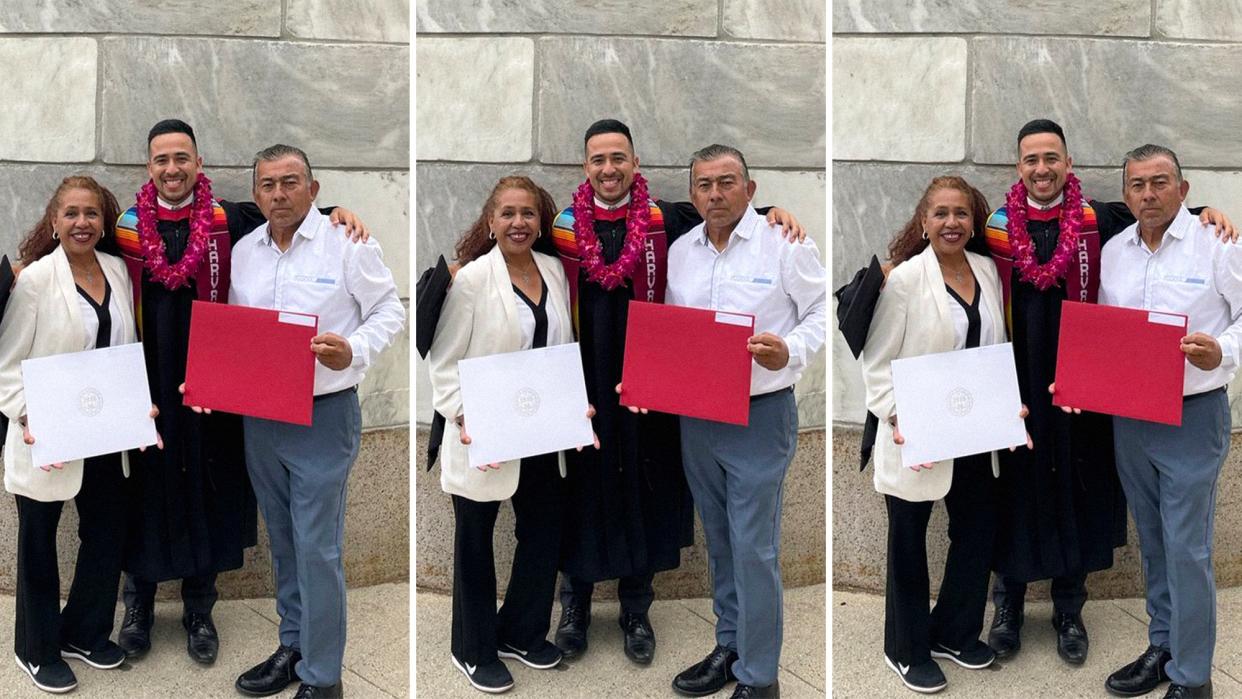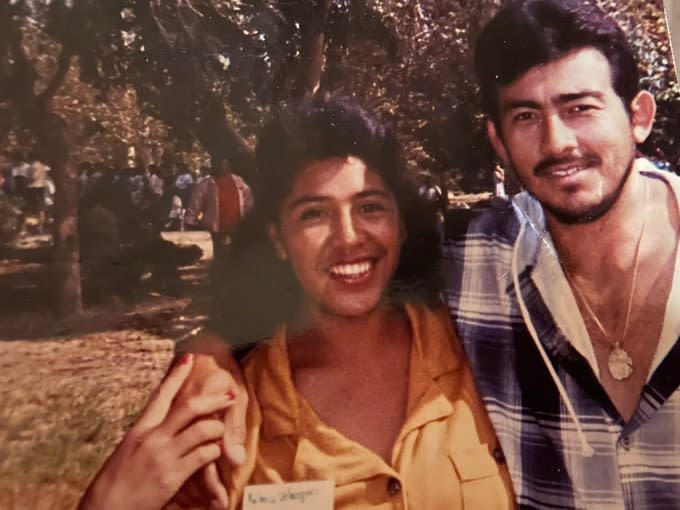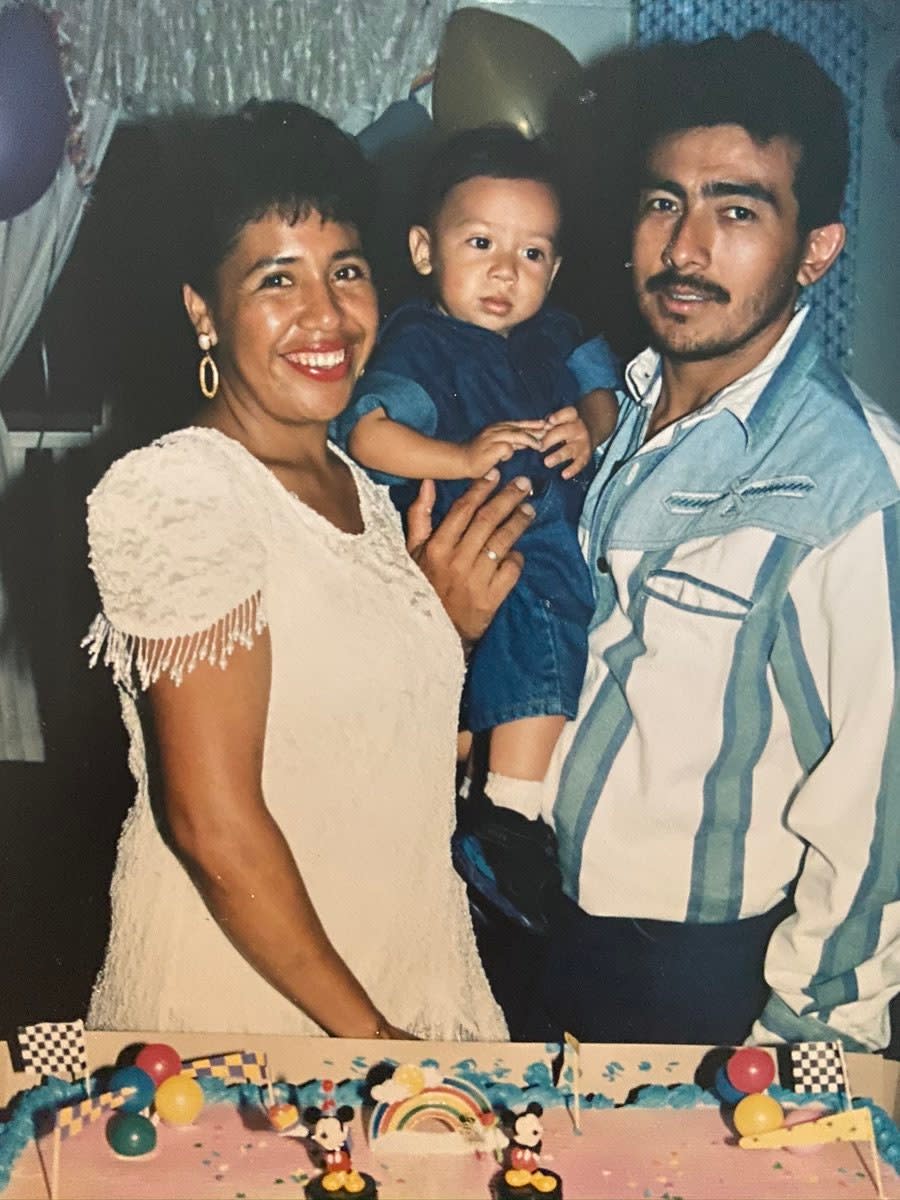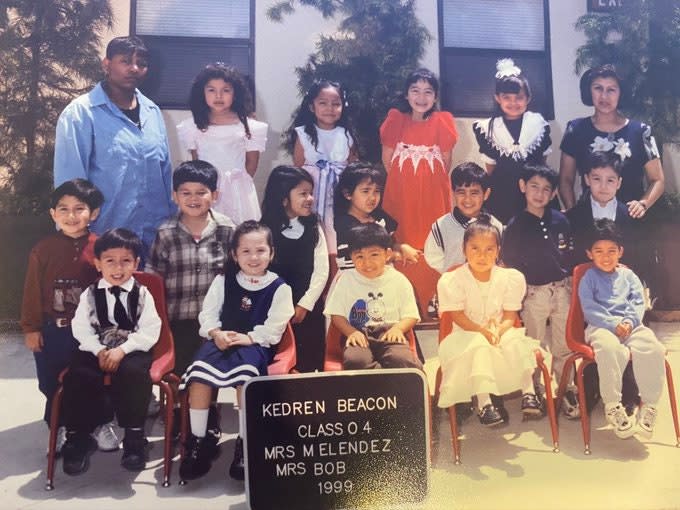David Velasquez, Harvard Medical and Business and Public Policy School Graduate, on His Family Story

When David Velasquez’s parents emigrated from Nicaragua to the United States, they were dropped off at a gas station in California. They spoke no English, had no family or friends, and could not afford clothes or diapers for their young children. Finding work was a challenge as his mother and father have a a fifth- and third-grade education, respectively. David's father stood on the street corner to pick up jobs as a day laborer to earn income for his family.
Despite his family's financial precarity, David excelled in school from a young age. When he was just three years old, his preschool teacher said to his mother, “Do you know you have a genius in your family? We have to take advantage of him in school. He is extraordinary, he’s going to be someone important.” This year, David will become the first person in the history of Harvard to graduate from Harvard Business School, Harvard Kennedy School, and Harvard Medical School at the same time.
Teen Vogue spoke with David and his parents, Calixto and Sara Velasquez, via Zoom about their experience immigrating to the United States and David’s remarkable achievements.
This conversation has been condensed and edited for clarity.
Teen Vogue: Mr. and Mrs. Velasquez, when you arrived in the United States, what were you expecting of yourself and David?
Calixto Velasquez: We arrived with an idea to prosper. We wanted to advance using hard work and effort. My wife’s first job was cleaning for just $2.25/hr. A Catholic church took us in. Women searched for food and cooked, and men would stand on the corner and take random jobs that came up. We did whatever it took to survive for our family. We wanted a good life for our four boys. We had the opportunity to work, and our focus was for them to get to school.

TV: As parents, did you focus more on David’s academic performance or developing his character?
Sara Velasquez: We focused on character traits. Discipline was very important to us. We told our sons to be punctual so that they can be even better, honest, and responsible people. When they came home from school, yes, we wanted them to do their homework. We never wanted them to miss school. But we also wanted kind children.
We saw how kind David was when he was young. In first or second grade, he knew we didn’t have much to eat at home. At school he was given food to eat. One day after school, from his sock, he took out two chicken nuggets and he gave them to us because he knew we were hungry. Since then, we knew he wanted to do something for our family.
TV: David, what challenges did you face when navigating your own educational experience?
David Velasquez: I grew up in the Los Angeles area and did grade school in Antelope Valley. We moved around and changed schools every two years due to Section 8 housing vouchers ending often. The schools I attended had a lot of fights and gangs. I just focused on running, basketball, and math.
After high school I went to the University of Southern California, and I was the first person in my family to go to college. Initially it was hard because I didn't know anyone else who had gone to college. I didn’t know how to navigate the complexities of college. But I did know one thing: I knew how to believe in myself.

TV: You believed in yourself enough to go beyond medical school and get two additional graduate degrees from Harvard. How did that decision come about?
DV: As I tried to figure out what to do with my medical degree, I realized early on that I needed to think about big issues and policy. I knew better health care policies would affect people like my parents. I got involved with an organization that tried to improve access to medical care. This was personal to me as my family and I [had] experienced homelessness. I realized a degree in public policy would help me design and deliver better health care systems.
I also did work in the C-suites of hospitals and nonprofits across Boston. I noticed that the people making decisions were familiar with business. I wanted to be comfortable having these discussions as well. It made sense to go to school for three degrees: public policy, business, and medical school. It’s important for people like me to be in these hyper-professional spaces.
TV: Many people are discouraged by goals that take as long to achieve as yours. How did you stay motivated?
DV: I was nervous about committing to apply to medical school and the additional degrees; however, if you are pursuing a goal for the right reasons, the journey itself becomes a part of your life. Since starting college, it’s been 11 years of education. Every year I learn something about myself and the world.
Also, this journey isn't just for me; I’m doing it for my community. When it comes to committing to any goal, so long as you have that north star, the decision to pursue it becomes a lot easier. I’ll be doing residency at Harvard with a focus on primary care. Afterwards, I want to go back to the underserved communities that I came from.

TV: At what point did you discover your ambition with school?
DV: I was ambitious during high school, but the ambition wasn’t focused on academics. I was ambitious about track and field and on the hills I ran on. When I committed to cross country and track, I wanted to be the best that I could be. I would tell myself, “I am going to do this as best I possibly can.”
Motivation can be transferable. When I started to get interested in math, and later medicine, I wanted to dive deep into the content and learn it as best as I possibly could. At that point, I knew what motivation looked like.
TV: You mentioned that you attended schools where fights were common. What led you to a different path than your peers?
DV: My parents and brothers were critical for my development. My dad made sure that we were disciplined and diligent. Their faith in us comes from them not having an opportunity when they were young. My dad fought in a war at 19; later he immigrated across Central America to Mexico to the United States. I had a father figure in the house who valued hard work and doing the right thing. My mom is the heart of the family. She always encouraged us to be good kids.
I made mistakes for sure; in fifth grade [I even] joined a gang, but it didn’t feel well. I just knew that path wasn’t for me.

TV: How important is mentorship for young adults?
DV: When I was in high school, my math teacher sought me out. He really believed in me. He gave me the motivation to apply to college in the first place. When I got to college, I started to realize how important mentors are. It is important to be intentional about finding people who are going to be in your corner and going to believe in you. Find people who say, “I love that for you. I want to support you in that. Let me know how I can help.”
TV: After getting three competitive degrees, how do you know you belong where you are?
DV: I am surrounded by people who similarly care about the issues that drive me. When I started medical school, I put healing others in front of everything. I surrounded myself with people who believed in a better future. It’s important to find a place that feels like home. I'm around people who have similar visions — similar drive to make things better.
Stay up-to-date with the politics team. Sign up for the Teen Vogue Take
Originally Appeared on Teen Vogue
Check out more Teen Vogue education coverage:

